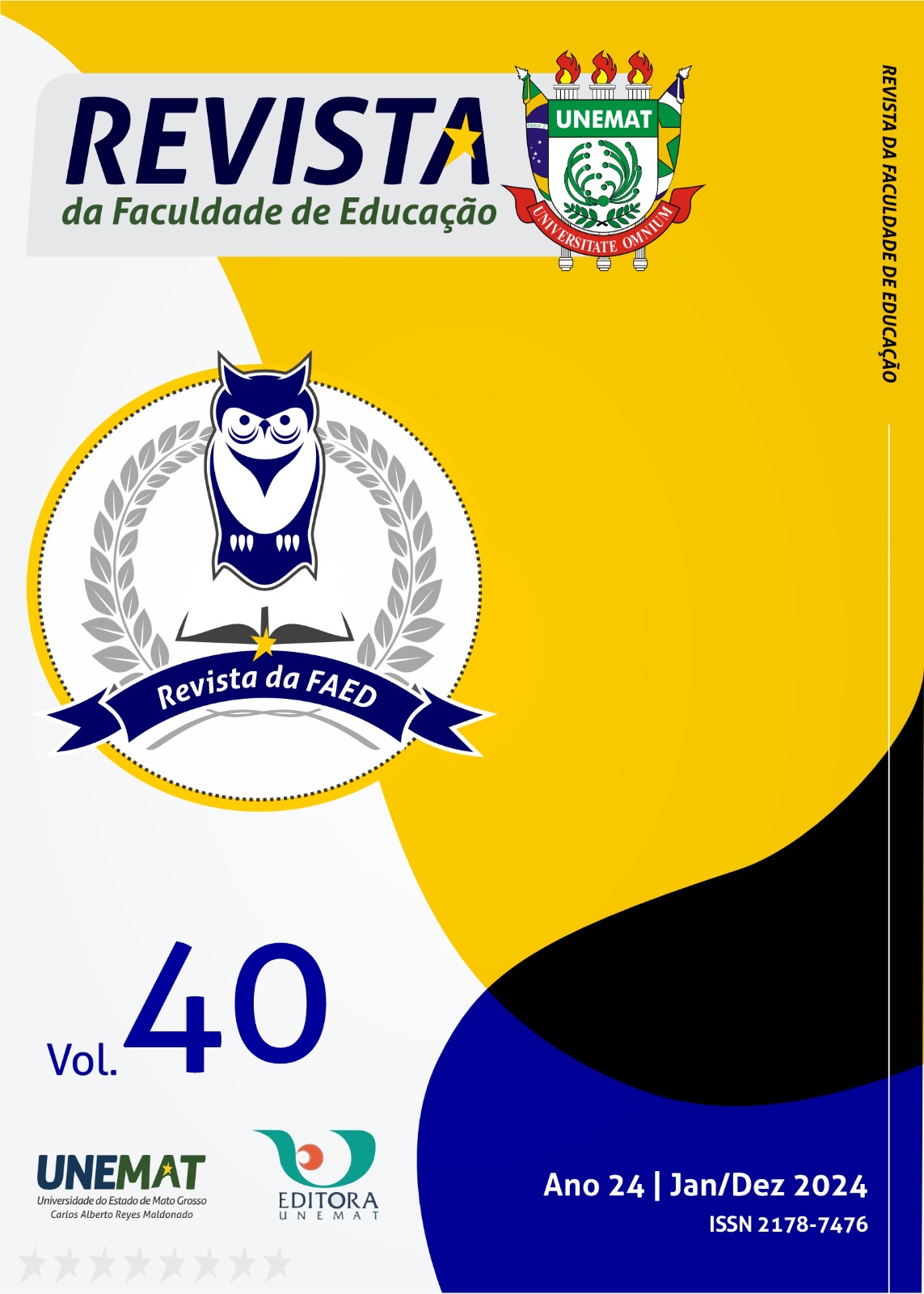RURAL WOMEN IN THE ORGANIZATION OF ASSOCIATED WORK: EXPERIENCES AND LEARNINGS AT ARPEP
DOI:
https://doi.org/10.30681/faed.v40i.12576Keywords:
pedagogical practices, Peasant women, Social organization, Associated workAbstract
This article is the result of research conducted during the Pedagogy course at Unemat. We investigated the experiences and learning of peasant women from the Regional Association of Extractive Producers of the Pantanal (ARPEP). The objective was to understand how women reconcile domestic activities and participate in collective groups, extract products from the land, produce food, receive professional training, organize an association and innovate their knowledge in organizational achievements. The scenario of implications aroused curiosity to know more about the lives of peasant women, their needs and achievements and how they organize their daily activities. In the methodology, we carried out field observation and four rounds of dialogues with peasant women workers. We based the analysis on critical and emancipatory pedagogy, to understand pedagogical and educational practices in non-school settings. The results present sociopolitical and cultural scenarios demonstrating organizational possibilities, achievements of rights and economic conditions by peasant women.
Downloads
References
CONTE, I. I. e WESCHENFELDER, N. V. Mulheres Camponesas em Luta: resistência, libertação e empoderamento. Revista da Faculdade de Educação, [S. l.], v. 17, n. 1, p. 11–27, 2019. Disponível em: https://periodicos.unemat.br/index.php/ppgedu/article/view/4018. Acesso: 10 jun. 2024.
DAVES, A. Mulheres, Raça e Gênero. Trad. Heci Regina Candiani. São Paulo: Boitempo, 2016.
EISLER, R. A. Verdadeira Riqueza das Nações: criando uma economia solidária. Trad. Claudia Gerpe Duarte. São Paulo: Cultrix, 2008.
FISCHER, M. C. B. TIRIBA, L. Saberes do Trabalho Associado. In. CATTANI. A.D; LAVILLE, J.-L.; GAIGER,
L. I.; HESPANHA, P. Dicionário Internacional da Outra Economia. Coimbra: Editora Almedina, 2009, p. 293-295.
FREIRE, P. Pedagogia da Autonomia. Saberes necessários à Prática Educativa. 65ª edição. Rio de Janeiro/São Paulo: Paz e Terra, 2020.
FREIRE, P. Pedagogia do Oprimido. 17ª edição. Rio de Janeiro: Paz e Terra, 1987.
GADOTTI, M. Economia Solidária Como Práxis Pedagógica. Editora e Livraria Instituto Paulo Freire. São Paulo, 2009.
HOOKS, B. O Feminismo é para Todo Mundo: políticas arrebatadoras. Trad. Bhuvi Libanio. Rio de Janeiro: Rosa dos Tempos, 2020.
MENDES, M. F.; NEVES, S. M. A. da S.; NEVES, R. J.; SILVA, T. P. A Organização das mulheres extrativistas na região sudoeste mato-grossense. Revista Estudos Feministas. Florianópolis, 2014. Disponível em, https://www.scielo.br/j/ref/a/CFxs7z7J6YtKHkMsfHk5ghm/?lang=pt. Acesso em 26 Abri. 2022.
MEZADRI, A. M; CIMA, J. I; TABORDA, N. W; GASPARETO, S. A. K.; COLLET, Z. Feminismo Camponês Popular: reflexões a partir de experiências do movimento de mulheres camponesas. São Paulo: Outras Expressões, 2020.
RIBEIRO, J. A.; SILVA, J. A. da; BIANO, J. de A.; ZART, L. L. Pedagogia do trabalho e a educação do campo: os arranjos entre currículo e saberes locais. Revista da Faculdade de Educação, [S. l.], v. 39, n. 1 2023. DOI: https://doi.org/10.30681/21787476.2023.E392309. Disponível em: https://periodicos.unemat.br/index.php/ppgedu/article/view/11564/8044. Acesso: 10 jun. 2024.
SGUAREZI, S.B; DUTTON, A. P.; MARTINS, E.C. Educação Popular e Trabalho Associado num Programa de Pós-Graduação Stricto Sensu em Educação-Nível Mestrado no Interior do Brasil: um diálogo necessário. Revista da Faculdade de Educação, [S. l.], v. 30, n. 2, p. 131–152, 2019. DOI:10.30681/2178-7476.2018.30.131152. Disponível em: https://periodicos.unemat.br/index.php/ppgedu/article/view/3881. Acesso: 10 jun. 2024.
TIRIBA, L. Educação Popular e Pedagogia(s) da Produção Associada. Caderno Cedes, Campinas, vol, 27, n. 71, p 87-88, jan./abril. 2007. Disponível em http://www.cedes.unicamp.br. Acesso em 20 ago.2023.
TRIVIÑOS, A. N. S. Introdução à Pesquisa em Ciências Sociais: a pesquisa qualitativa em educação. São Paulo: Atlas, 1987.
ZART, L. L. A interpretação das coisas do mundo: a compreensão da ciência a partir da arte. Revista da Faculdade de Educação, [S. l.], v. 38, n. 2, p. 75–88, 2023. DOI:10.30681/21787476.2022.38.7588. Disponível em: https://periodicos.unemat.br/index.php/ppgedu/article/view/10928. Acesso: 10 jun. 2024.
Downloads
Published
Issue
Section
License
Copyright (c) 2024 Maria Neuza Machado Cabral, Laudemir Luiz Zart

This work is licensed under a Creative Commons Attribution-NonCommercial 4.0 International License.
Licença CC-BY-NC
"Revista da Faculdade de Educação adota a licença Creative Commons BY-NC do tipo "Atribuição Não Comercial". Essa licença permite, exceto onde está identificado, que o usuário final remixe, adapte e crie a partir do seu trabalho para fins não comerciais, sob a condição de atribuir o devido crédito e da forma especificada pelo autor ou licenciante".





















